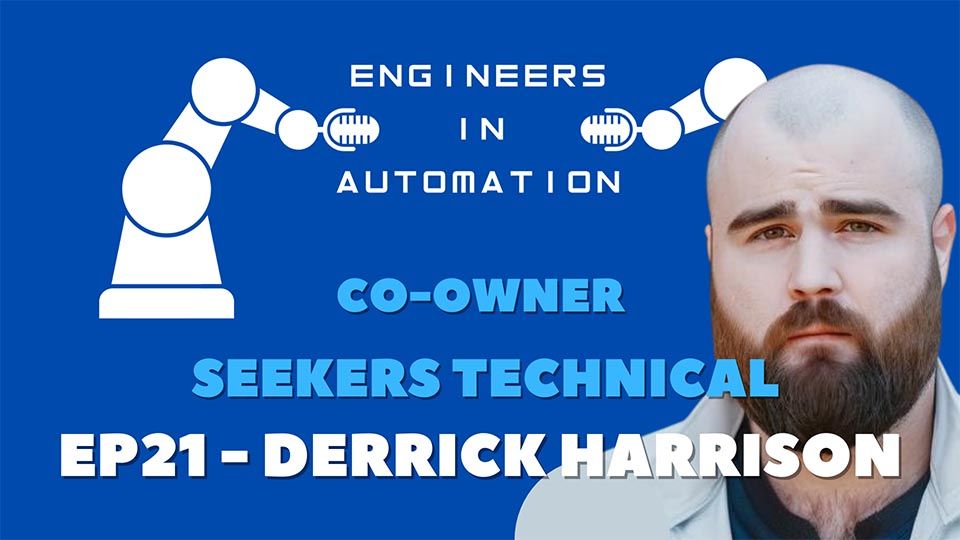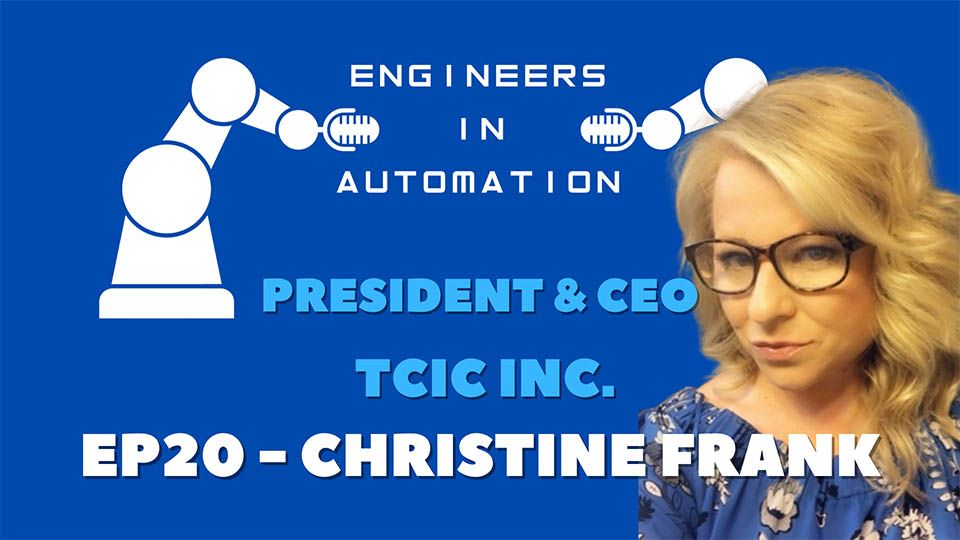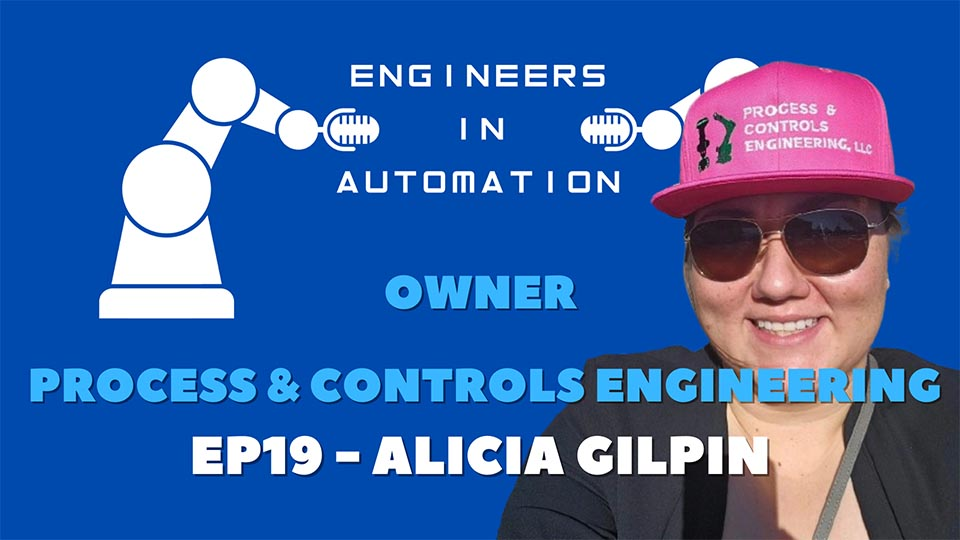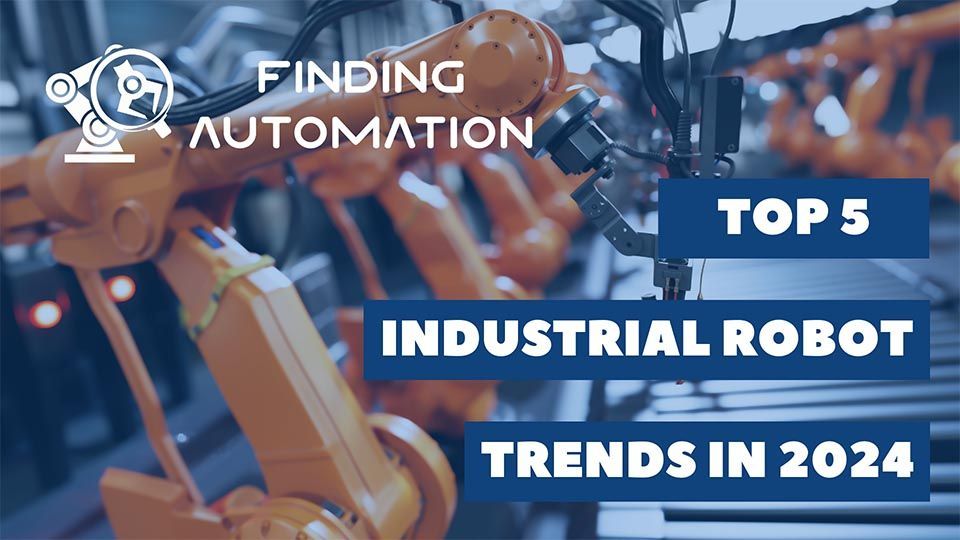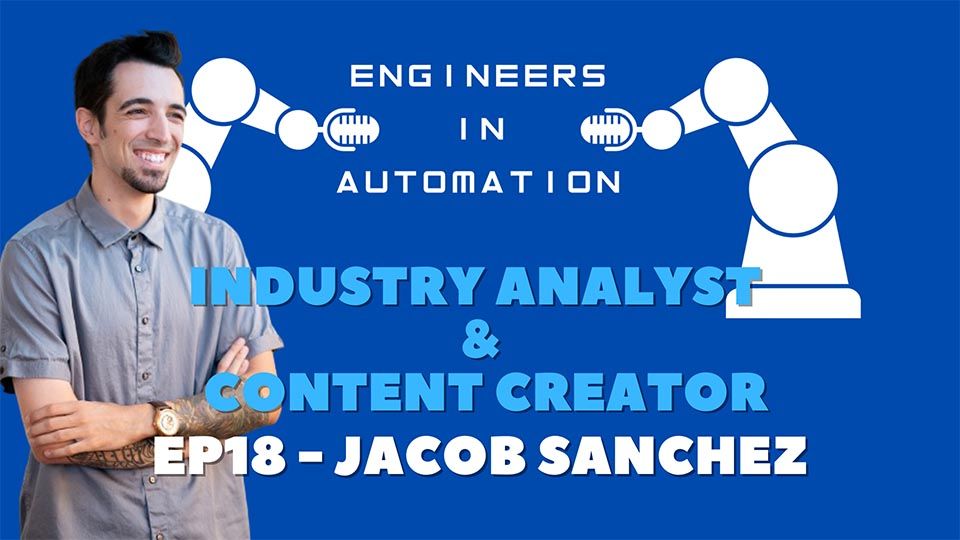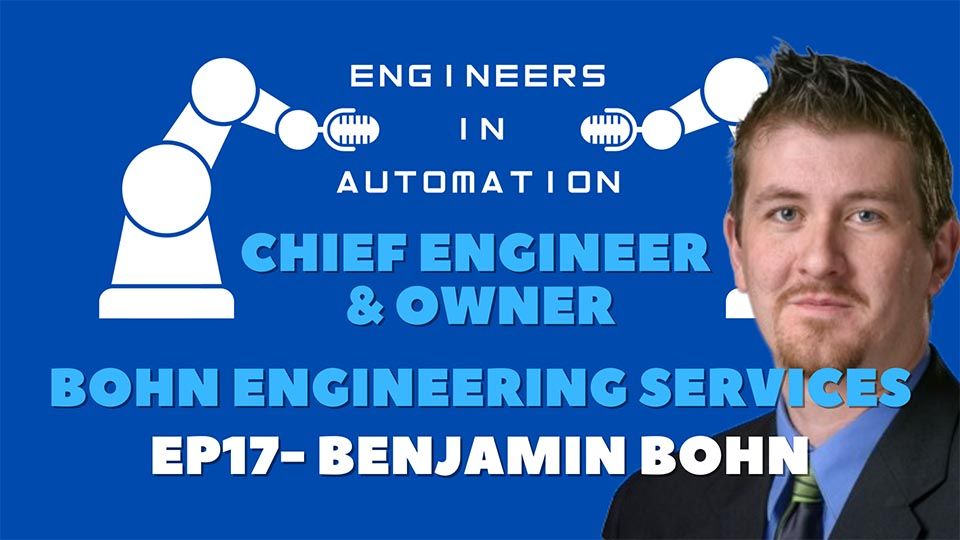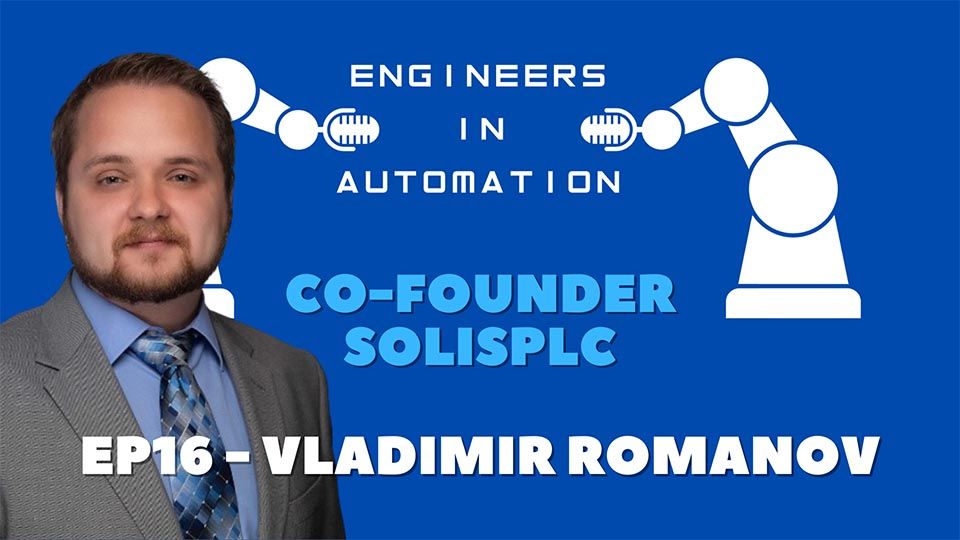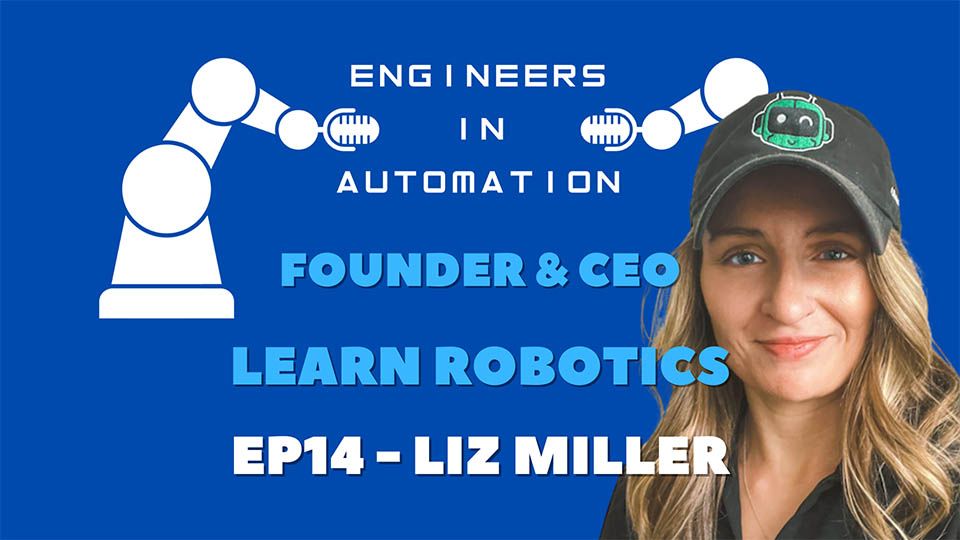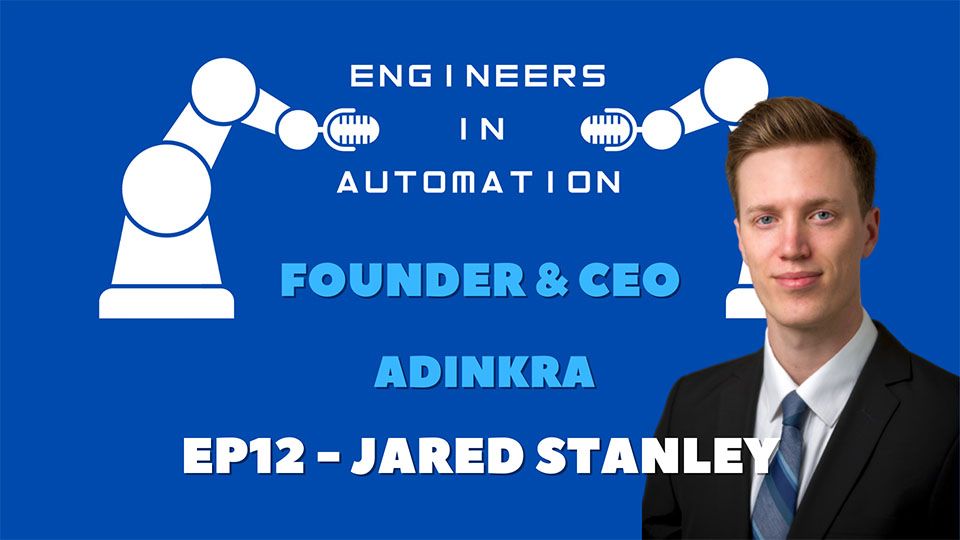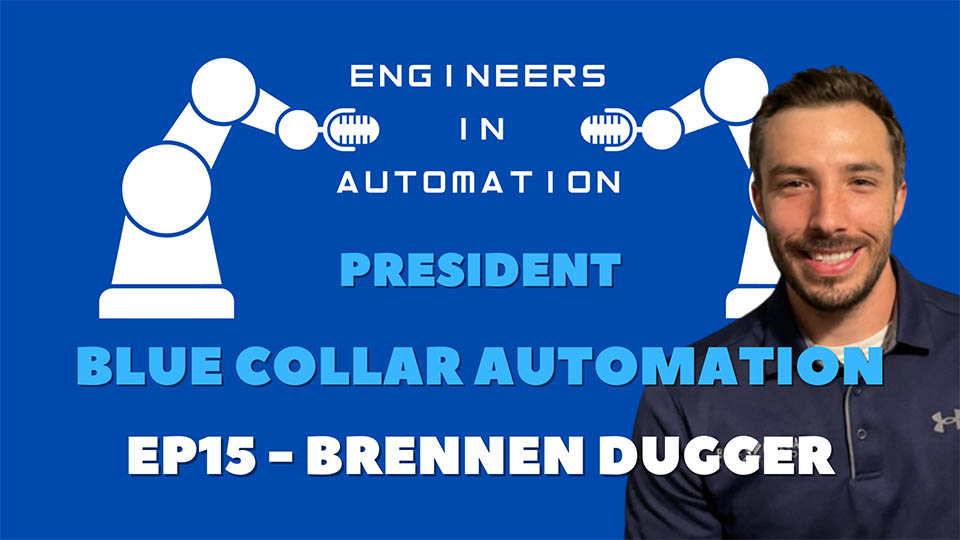Sean Dotson | Engineers In Automation
Engineers in Automation - Sean Dotson | Episode 13
In this episode, we talk with Sean Dotson, the founder and former president of RND Automation. We discuss the automation industry in Florida and what led him to start an automation company in his home state. We also discussed his likes and dislikes in the industry and what advice he would give someone interested in the automation industry.
WATCH THIS ENGINEERS IN AUTOMATION EPISODE
Keegan Dillon – Host (KD): Hi, my name is Keegan, and this is Engineers in Automation. On today's episode, we're going to be talking with Sean Dotson. He's the founder and former president of RND Automation. We're going to talk with him a little bit about starting the company, growing a business. We are also going to talk about what he's currently doing today, as well as other things in the automation industry, such as his likes, his dislikes, and some of the lessons learned he's had. Now, let's go talk automation!
KD: Hi, and welcome to today's episode. I'm your host, Keegan. And I'm here with Sean Dotson, the founder and former president of RND Automation. Sean, welcome to today's episode!
Sean Dotson – Guest (SD): Thank you. Thanks for having me. I appreciate it.
Sean Dotson's Automation Background:
KD: Yeah, of course. And let's just dive right into it. Can you give us a little bit of intro about yourself?
SD: Sure, yeah, I've been in the automation industry, pretty much my entire career, worked for an automation company for a while, and then founded RND Automation about 18 years ago, and then sold it in 2020, late 2020, to a private equity firm. Stayed on with them for about a year and a half. And then, this last October, I exited the firm. And one just to take some time off, you know, after 18 years of owning a business, there's lots of stresses, as most business owners know. But the other thing was just to look at what else is there in the industry, you know, what's my next adventure gonna be? So that's kind of my history been very active in automation. It's been my career and my passion for pretty much my entire adult life. So it's, once you get into it, it's kind of hard to get out.
KD: Yeah, great. And hopefully, we'll touch on some of the next steps that you're moving into, um, but briefly, let's, how did you know, get your background in automation, what, you know, drove you to that?
SD: So, I was always one of those kids who would, you know, take apart the alarm clock, or the old electronics ever remember my dad who was an electrical engineer, so I've got a lot of engineers, my family, so probably, it's kind of built into the blood, but I remember was taking apart an old Cathode Ray TV, and he freaked out because the big capacitor on the back, you know, and he had to explain to me how to discharge the capacitor. And so you know, I will always learn that way. In high school, I worked at a hardware store, which was a great introduction to not only how to do home improvement projects but just how things work, right and solving problems. So, people would come to you, and it was simple problems, I gotta go from this one-inch pipe to a half-inch pipe, and I gotta make a 90-degree turn. Just simple things like that. How do you solve their issues? I really enjoyed that.
Went to college for mechanical engineering, just because I was always very mechanical in nature. While I was in college, I worked my way through college as an auto mechanic. So, I started off just changing batteries and tires and worked my way up to, to breaks and struts. And it just kind of kept going from there.
So, after I got out of school, I also did a lot of programming for not only robotics, but also, I worked on some programming, this new thing called the World Wide Web, back in 96, 97. It was kind of really in its infancy. So, I actually thought I might end up going into that, and then decided I did not want to move to California and be in Silicon Valley. So, I got a job at a school doing design work for a packaging company. And then kind of really fell in love with it. And then found another job at an automation company with robotics, which I did a lot of robotics studying at college. And then from there on out, it was just, you know, it became, you know, a love of mine is being able to see the fruits of your labor.
So you come up with a concept, you actually build this machine, you install the machine, and then product is coming off the machine. I've always thought was the coolest thing walking down a store aisle and pointing to something and saying that came off the machine that, you know, RND designed or that I designed or programmed or whatever.
Why start an automation company?
KD: Yeah, very cool. And can I just touch on it as well? You know, being a president of a large company like that. You know what, what made you want to want to dive into that realm of the business instead of just being an engineer and keeping and staying as a designer? You know what, what pushed you to say, “Hey, maybe I want to try to, you know, run the company,” or run a company.
SD: Well, to be totally honest, unemployment. company I was working for before RND. We got bought by we were acquired three times in like a five-year period. We were then a very small piece of this very large global puzzle. And they decided that they had to be facilitators and that our facility was one that was going to be shut down. I was running the facility at the time. So, they basically said, All right, your job to be the last day out the door and lock it all up. And we need you to move the products all over the world and help people get jobs. So I did all that.
But as I was doing it, I said, “Alright, I know, I guess I gotta get a job here eventually, too.” And I just decided, like, you know, I really enjoy what I do here. I enjoyed designing equipment and running this facility. Why don't I just kind of keep doing that? So I convinced them to basically give slash sell the small automation company that was left over to myself and two partners. So we kind of went into it with that, hey, we all we love designing equipment, we love programming equipment, but you also gotta run a business. So it was a bit of baptism by fire. So I was just dropped into this and started just figuring things out.
So you know, one of the stories I tell is that I got a letter, you know, from the county after like, six, seven months going like, "Hey, you haven't paid your, your your sales tax bill in six or seven months." And I'm like, "I didn't know I had a sales tax bill." So that's what, Yeah, oops. So that's when you call it the accountant and go, what's this sales tax bill? I gotta pay every month. You know, they're like, oh, yeah, using sales tax, like, oh, haven't heard of that one. So, you know, a lot of the things you'll learn the hard way. But honestly, the best way to learn right, because those lessons really stick with you when you learn the hard way. And then you become proactive.
KD: And especially when it's with your own money, right?
SD: Yes, yes, exactly. It's one thing, you know, not paying a couple hundred dollars’ worth of tax to the county. It's completely different when you're not paying thousands to the government, you know, the federal government. So you start looking into federal taxes a little bit more than right. So it causes you to really do your homework.
The industrial automation industry in Florida.
KD: And if you are a Florida boy, I want to touch on this: What are some advantages of being in Florida? You know, especially from an automation standpoint, you know, generally, people are always thinking, you know, the Midwest or, you know, other parts of the South Texas or, you know, Alabama, South Carolina. But what are some advantages of being down in Florida?
SD: Well, I mean, the biggest advantage, of course, is no snow, you know, so I love I love playing in the snow. I don't like working in the snow. Yeah, I am a Florida boy, born and raised in Tampa, just north of Sarasota, and pretty much my entire life here in Florida. You know, Florida was one of those markets, like when I worked for the packaging company. And then I got found the job at the automation company, I was really surprised to see, oh, there's an automation company. You know, in Florida, it's a service market. That's, you know, tourism and hotels and things like that agriculture, you don't think of manufacturing. But you know, what, what I found out at the time, and which is growing to be even more and more true, is that Florida is a very manufacturing friendly state.
Now, we don't have large scale, you know, you're not making truck axles and train cars, and you know, big foundries and things like that. But there are a lot of medical device companies. There's a lot of consumer products, companies, electronics companies, what I'm gonna call that high-tech, manufacturing. We used to do a lot of work back when NASA was launching the space shuttle. There were all these tier-one, two, and three suppliers for NASA. On the Space Coast, we did a lot of work for those companies. When NASA stopped launching the shuttle, a lot of those companies dried up, but now SpaceX and Blue Origin are back. And all those tier one, two, and three companies are starting to develop again.
So, you know, it's kind of that sleeper market. Back in the day, there wasn't a lot of competition, it was really quite honestly, you know, RND and one other company that was pretty much sharing the state. Now, I think we're up to five or six automation companies in Florida and various sizes, and growing and people are seeing the Florida market as important by putting offices in South Carolina, Georgia, and North Carolina. Again, pretty, pretty easy to get to Florida from those markets.
Sean's Next Chapter:
KD: Yep. And so let's kind of touch on right now what, you know, what kind of projects are you working on? Now? I know you said, you know, you've moved on from RND, and, you know, what, what kind of projects? What's your next steps here?
SD: Alright, so right now, I'm doing some helping some manufacturers, some end manufacturers look at their processes, determine, hey, what needs to be automated, you know, do we need to automate should we automate it just giving them some real high-level recommendations? You know, helping out a couple of companies that are automation adjacent, it's machinery, but it's not necessarily automation machinery. Helping them look at some of their processes as well, and maybe applying some of the lessons learned from automation machinery to this non-automation machinery. And then, of course, I'm also open to new C-level, VP level, opportunities that other organizations.
You know, I think I've always been on that integrator side. I think it would kind of be interesting to look at it from the other side, you know, from the supplier side, you know, maybe a robot company or a feeder company or something like that, that's selling components that go into the automation. But right now, I'm kind of keeping my options open and keeping myself busy a little bit. I have a, I don't even call it a podcast, it's I go hiking in the woods, and I answer questions that people ask it's Automation AMA, it's just something quite honestly, it's fun to do while I'm out in the woods. And I like, I like giving back to the community of, you know, my knowledge over the years.
Sean Dotson's Technical Articles:
KD: And honestly, with that, that leads right into my next question. I know that you have written some technical articles and articles on LinkedIn, that are engineering articles and things of that nature. Is that something that you also enjoyed doing? Are you going to? Are we going to be seeing more of those? I know. You have about 15 out right now. Yeah, still gonna continue to do now.
SD: Yeah, I will, you know, I, I, it's funny, I said, I went to school for mechanical engineering, I actually my first semester, I was actually an English major, which people are always like, what I just, I always enjoyed writing, I thought that perhaps I might go, you know, into doing writing of some sort. And but I also had this technical background too and always really loved engineering. And quite honestly, I, you know, start doing a lot of research to what an English major makes versus what a mechanical engineer makes. And that helps that, as I said, “Hey, I can always write on the side, right?”
So I've always enjoyed doing that. I've always also enjoyed just giving back to whatever community I'm part of. And earlier in my career, I was very involved with 3D CAD, with Autodesk. And I did some consulting with them on their adventure product from day one. So, I was involved in Inventor for a long time. So, people would ask me questions about Inventor and how to do things. And then, quite honestly, I got tired of answering the same questions over and over. So I kind of did a little write-up, and then I put it on a website. And then, I had more tutorials of how to do things. And people would, you know, ask more and more questions, so that I started a forum, back in the days when they had the web forums, right? And it started, those got pretty, pretty popular as well. And then it got to the point where it became this whole community that I wasn't answering the questions all the time anymore. The other members of the community were answering the questions.
KD: Wow, that's cool.
SD: So yeah, so I grew that up. So it was always it's always been in my blood, and I always knew I nature to kind of help answer questions and do what I can to help other people maybe not make the mistakes I made, or, or maybe a little make it a little bit easier on them.
KD: Right. Yeah. And that actually is somewhat similar to my path as well. I think, initially, you know, if you were to talk to my English teacher in high school, that I would be, you know, I think I've written almost 100 blogs now. They wouldn't believe me. And I built a couple of websites and did the whole thing both on both for myself and, you know, just, it's funny how this career can change your path so quickly and easily. And, you know, like I said, it's just fun sending out information, learning new things, sharing information, and, you know, learning from others. It’s something that I've found is super fun. And, you know, I think it's really important to learn from others who have experienced it, right? If there's information that you could share, you know, from growing your business, that, you know, I could take into growing my business, I think that stuff like that is just so useful. And I find now, especially through LinkedIn and so many different connections I've made, and I'm sure the same for you. There's just such an open network of people sharing ideas and information now it's fantastic.
SD: Yeah, networking has always been super important to me as well. That's why I've always enjoyed going to trade shows and going to conferences, like A3 and the Robot Forum and all. Just talking to people about their life experiences and sharing war stories and learning lessons from each other. It's just it's how it's how you grow, you know, as a person, both professionally and personally. It's always just been something I really love. I always said I'm, I'm an extrovert. I'm an extroverted introvert, really, because most engineers are pretty introverted. But I at least like I like talking to the engineers at least.
Automation Industry Likes:
KD: Yeah, right. Yeah. Me to have in the same boat. And with that, so talking to those engineers, what are some of those things that you really like about the automation industry itself?
SD: Kind of going back to that talk a little bit before. It's nice to see what you've done at the end of the day, right? So, you know, while I have tons of respect for my electrical designers, and controls, programmers and all that, and I've done that stuff as well, the reason I went into mechanical was that you can't see the code, you can't see the electrons flowing through the wires, you know, super important, of course, you see the mechanics, you see the robot move, and you see the conveyor, you see everything. And that, to me, was just so rewarding at the end of the day, seeing what I built, being on that factory floor, and helping a company grow.
Early in my career, when I explain, go to a cocktail party or a wedding or something like that, people ask what you do for a living? I say, like, “I own an automation company.” A lot of times, “Oh, you put people out of work?” Well, no, I've never sold a machine to a company that was reducing staff. It was companies that could not find enough people to produce their products. That's the only way they could do it. And it elevated those assembly line workers or people who were manually putting things together, it elevated their talent. So now they are running the machine.
KD: Becoming robot programmers or PLC programmers or technicians. That kind of stuff.
SD: Yeah, exactly! And I would come back years later to a factory and see that same operator that was putting something together manually. Then, we introduce a piece of automation. And now they their new title was something like, you know, it was there, maybe maintenance tech, or they were machine operators or something, and they were running multiple robots cells. And they were they had people underneath them as material runners moving material around. They were making sure all the machines were running well. So, it was just, you know, those relationships through that were really, really, really nice that you got to see somebody develop over the years because of something that your company did.
Automation Industry Dislikes:
KD: And so that's the positive side on, you know, everyone's got their negatives in this industry. What are some of the negatives within the automation industry?
SD: Oh, boy, we don't have enough time. For all those, it's easier to complain is it?
KD: A short list of the good stuff and a long list of the bad.
SD: Yeah, one of the hard. One of the frustrating things, which is not going to be a surprise to anybody who's been in the automation industry, is when you have a customer, you've presented a solution. You've shown them what the ROI is, you show them all the positives, it is just everybody in the room is in total agreement, this is the way to do this, and they just don't move forward. You know, it's frustrated, it's hard for me to watch a company make a bad decision. And it's frustrating. And of course, I mean, you know, selfishly yes, we want to sell the piece of equipment, we get that right. But at the same time, it's like take that away from it, here's all the advantages to you, as a manufacturer, you're gonna be able to produce more faster, better or lower your labor cost, change over whatever it happens to be, why are you not doing this?
And a lot of times it comes down to fear of making a mistake. And you know, lack of education, maybe not understanding automation, or, or understanding the return on investment. So, you know, I spend a lot of time with customers not talking about, you know, what robot we're going to use? Or, what does a machine look like? Or exactly how many widgets is going to poke out? But why are you why are you waiting? Right? Is it? Is it? Are you scared? Are you concerned that we're not going to do a good job? Are you concerned that you made the wrong decision? You know, let's just talk person to person what is it that's preventing you from moving forward with this?
KD: Right, and usually, it isn’t money, right? The shocking part is, usually, it's not the money.
SD: It's never. I had a sales coach many, many years ago. And his famous phrase was, “It's never about the dollars. Never!”
KD: They have something somewhere save for a project like this. They would have done internal assessments.
SD: Exactly. Or if you can show them that this has got a great ROI and double your production. They’ll borrow money from somewhere, some other project, or, you know, pull it away, “Hey, we're saving this labor. You don't need to pay that labor money. Hey, there’s some money for the machine.” So it's never it's never about the dollars. There's always something fundamental. Usually, it's emotional. That is the reason people are not moving forward with a project.
Now, they're going with a competitor that's completely different. Maybe they had a better solution or a better price. But so often we see, I talk to my competitor sometimes, and I know those guys bid on the same job, and I'm like, “Hey, do you want to get that job?” Like “No, neither one of us got.” I'm like okay, then nobody did. Yeah. So, yeah, that's a chance to go back and talk to the customer, try to, you know, try to rekindle it.
Automation Industry Lessons Learned:
KD: And in with that, I guess let's kind of touch on some of those lessons learned. You know, what are some good lessons learned that you've had? You know, you've like said you've had opportunities, run organizations, do things on your own, you know, what are some good lessons learned for people in the automation industry? That can take your knowledge and share?
SD: Yeah, that's, that's a lot. I mean, I could take a lot of time. But, you know, some of the fundamentals are, sell your customer on your capabilities and fixing their problem, you know, providing a solution. You know, quite honestly, a lot of them really don't care. And I'm gonna back away from this a little bit. They don't care about your technical solution. As much as they care about solving their problem, you still have to show that you do know what, you have the technical solution, and you are technically savvy. But let's be honest, you know, the difference between robot brand A and brand B is not going to make or break you a lot of times. You’ve got to show them that you are thinking beyond the scope of maybe just what their problem is.
So I told the story before of customer brought me and said, “Here's our problem.” And I said, “Well, can you show me upstream?” They said, “That's not our problem.” “Like, just show me upstream.” And we went upstream a few steps. And by solving that problem, it eliminated the problem downstream. They didn't even need to buy. So, it was a cheaper piece of equipment to fix the problem upstream than it was going to be downstream.
KD: So that's very, that's very good. That's it's a good, good thing to think about. Okay, not just looking at this bottleneck. But is there something causing if we do fix this bottleneck, because there's something even slower up ahead? Or something slower behind? Right? Is this truly your bottleneck or that area you need to fix?
SD: Exactly, right! Ask a lot of questions, right? That's sometimes, we were able to save people a lot of money, saying, “You’ve got this molded part. And but there's no feature on it for us to be able to orient it. So we have to use a vision system to be able to orient with the robot and all. It looks like you could add a little rib here to this plastic part. And then we could use a you know, a vibratory bowl feeder or something to align the part. Could you do that?” And sometimes they're like, “Yeah, sure. That's not a problem. The products not finalized, or we can add that piece.” Great. We just saved you a lot of money.
Other times, no, you know, if it's a med device, sorry, we're not changing it. Right? We can't get him re-qualified. Okay, that's fine. But we tried to save you some money by making these suggestions, maybe for generation two, keep that in mind. So I think just, you know, being more than just a machine builder, you've got to be a provider of solutions. And a lot of times, you gotta you gotta push back a little bit to the customer. You know, “No, we can't change this.” “Okay? I know you're saying that. But why can't you change it?” Explain to me why so I understand it. Because you might find out that they really can change it; they just don't want to change it. Which is, again, you're given the option, we can save you some money by changing it, or it's going to be more expensive. If you don't, I just want to make sure you understand that impact.
Industrial Automation Advice For Young Engineers:
KD: Yeah, no, very good insight. And I think I learned something there, too. So that's good. Appreciate it. Um, let's touch on, you know, if somebody is interested in getting into automation, you know, what's some advice that you'd give? You've done a lot of different things in this industry. And with your background, you know, what's, you know, right, you know, something that you would want to advise somebody on?
SD: Yeah, I always tell people, if you want to get into automation, don't do something easy, like brain surgery, or alligator wrestling or something like that. It's a tough industry, you know, it's rewarding. I think anybody who's been to it long enough, will sit back and look at their battle scars and go like, “Why did I get into this?” You know, this is a tough industry. And it is, but you know, I really think if you're passionate about it, though, all those all those scars fade away pretty quick. Um, somebody who's just getting into it. I mean, if we're talking about somebody in high school or college who's considering it, get as much hands-on experience as possible. So many engineers that I've hired over the years didn't have I was fortunate enough, like I said, working as a mechanic and in the hardware store, I at least had some hands-on knowledge, and I'd run a drill press I had turned a lathe before. I had, you know, put piping together and done plumbing and electrical and stuff like that. So, I had a little extra leg up, but I see a lot of engineers who really they come into really, really book smart right? They are, they are amazing when it comes to programming and CAD and things like that, but they've never ran a mill, ever right? They don't understand that you can't have a square pocket necessarily. They just don't think about that. They don't realize that if they broke this into two parts, it only needs one setup each, versus if we hug it out of one big piece of aluminum, it needs six or seven different setups.
So I really think you'll go to as many things as possible, programming as many languages as you can get into wire immune, if you're a mechanical engineer, understand the basics of electricity and circuits. Vice versa. Same thing if you're, you know, electrical, understand pneumatics and understand some basic mechanics and things like that. But go out and just do do do as much as you can get your hands dirty, go talk to the assemblers, and the machine builders, they are a wealth of knowledge. I have gotten dressed down, embarrassed, and, you know, cussed at by more than I can, you know, more machine builders that I can think of, but that's how I learned to design machines better. So they wouldn't yell at me because they couldn't reach that bolts that was way up underneath the machine, right?
KD: Right. Yeah, no, I think that's a great point. I think that was one thing for me, at least, how you mentioned, you know, reaching out and learning a little bit more electrical, that for me, I just didn't have that real experience that much, I guess, in college, and then in the real world, then I had to learn it. And that put me behind for a little bit, and then caught back up. And now I'm able to do things, you know, even around my house now that that makes it makes it a lot easier than, you know, before not having anything else. I think that's also something good just venture out also, not just within your field, but reach out in a couple of different ones. And especially in automation, right, you could do some robot programming and electrical, you could do PLC, which is electrical with the robot programming, you could do, you know, all design work like you mentioned with, you know, some actual, electrical or, you know, even mechanical and bigger mix of things, I guess, I’d say.
SD: Some of the most successful engineers I've ever met are ones that, you know, are really good in one area, and they're pretty good and a bunch of other areas, right? So you need to keep your skill set, you know, pretty, pretty wide. You know, again, I was first one does. I'm not one that's gonna sit there and do load calculations on an electrical panel and figure out thermal loading. And do we need an AC in the enclosure? Not, but I can, you know, I can troubleshoot a machine if I have to, just because I learned all that. So those are good skill sets to have?
Connect With Sean Dotson On LinkedIn:
KD: Yes, especially in automation. And then on that, where can people reach out to you and find you?
SD: Yeah, I mean, most people probably know me from LinkedIn. So you can find me, you know, Sean Dotson, you know, at LinkedIn, and if you want to get a hold of me by email, it's Sean@automationama.com. And the AMA has asked me anything. It's an old term from Reddit years ago. People used to go on and they do an AMA about just whatever their field of expertise was, we could ask, ask them any questions about that. So I got kind of picked up on that. And so that's, you know, people feel free to reach out to me and ask me many questions about automation and automation industry, and where we think we're going, so again, I enjoyed the conversations and networking.
KD: Yeah, well, hey, appreciate it. We'll put the links down below. And then, you know, I've been following you for a couple of years now. And yeah, you do post a lot of great information. So always, always good to give you a follow. I learned a lot almost weekly, it seems. So know. I appreciate it. But I just want to say thanks. Thanks for being on today's show. If you guys enjoyed today's show, please give us a like, comment, share. And don't forget to join us next time here on Engineers in Automation. Thanks!
SD: Thank you.
If you enjoyed that podcast episode, get more information below!
CONTACT OUR GUEST:
Connect with Sean Dotson on LinkedIn.
Learn more about Sean by visiting his Linktree.
Learn about Automation AMA.
SPECIAL THANKS TO OUR SPONSOR:
JOINER Services sponsored this episode. A platform where self-employed engineering contractors can showcase their own talents, and businesses have an opportunity to hire their services. If you want to learn more about JOINER Services and its engineering service platform for contract engineers, follow them on social media or sign-up on their website.
